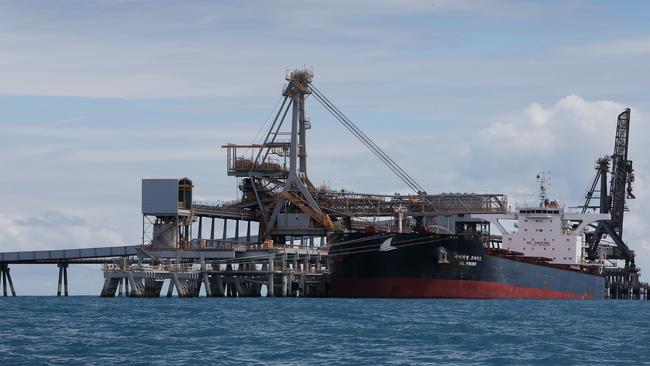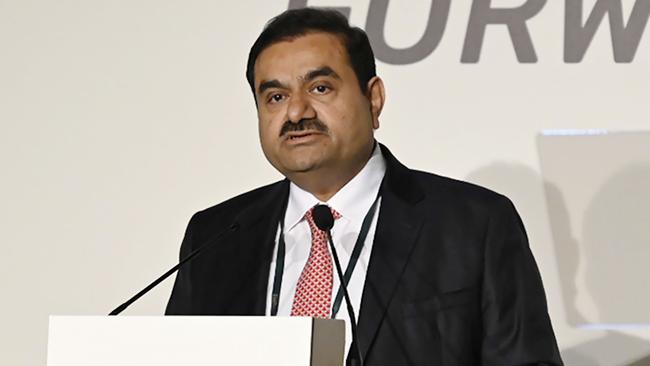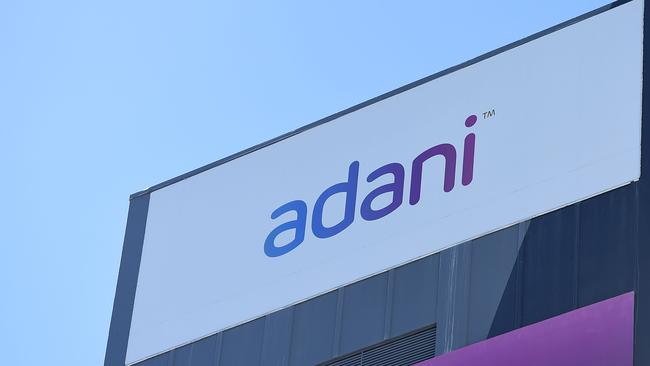Hindenburg Research accuses Adani executive of role in diamond scam
A high-profile US activist investor has launched an aggressive attack on Indian conglomerate Adani – claiming its top Australian executive played a major role in a diamond scam.

A high-profile US activist investor has launched an aggressive attack on Indian conglomerate Adani – claiming its top Australian executive played a major role in a diamond scam, defrauding taxpayers of more than $US150m ($210m).
But Adani, which is developing the Carmichael coal mine and operates rail and port infrastructure in Queensland, has immediately hit back at the claims made by Hindenburg Research, describing them as “maliciously mischievous” and “unresearched”.
Hindenburg is an investment research firm that takes short positions and publishes reports detailing its views on alleged wrongdoing by the companies it targets.
Hindenburg had notably pursued Nikola Corporation, a US manufacturer of electric vehicles, prompting regulatory action. Nikola’s founder, Trevor Milton, was later found guilty of fraud.
The firm, in a new report, has accused the Ahmedabad-based conglomerate controlled by Gautam Adani of accounting fraud and hiding significant debts.
Among the allegations, however, are claims Mr Adani’s brother-in-law, Samir Vora, was a key figure in a diamond trading scam in 2004 and 2005. It cites a report written by India’s Directorate of Revenue Intelligence – and dated 2013 – to support those claims. Mr Vora is now the executive director of Adani Australia. An appeals tribunal in India cleared him in 2015 after finding the revenues investigation failed to “produce any tangible evidence” proving the circular trading allegations.

Jatin Jalundhwala, the company’s legal chief, said Hindenburg’s allegations were “designed to have a deleterious effect on the share values of Adani”, noting the investment firm had disclosed it was short on Adani securities.
“We are deeply disturbed by this intentional and reckless attempt by a foreign entity to mislead the investor community and the general public, undermine the goodwill and reputation of (Adani) and its leaders, and sabotage the Follow-on Public Offering from Adani Enterprises,” he said in a statement. The company was considering taking “remedial and punitive action” against the authors of the report in the US and India, Mr Jalundhwala said.
Adani is best known in Australia for the decade-long battle over the construction of its Carmichael coal mine, which played a key role in deciding the outcome of the 2017 federal election and remains one of the most divisive mining operations in the country.
But the Hindenburg report alleges Adani’s Australian operations also played a key role in helping hide losses made elsewhere in the group between 2013 and 2015 – after Mr Vora first became a director of some of Adani’s Australian companies, including Adani Mining, in 2011.
The report claims that one of the group’s head companies, Adani Enterprises, used two asset transfers from subsidiary Adani Mining in Australia worth $303m, along with loans between group companies, to hide losses from its investors in India and avoid taking a writedown on its assets at a time of growing concern about the company’s debt levels.
A Singapore-registered company, Carmichael Rail and Port Singapore Holdings – controlled by Mr Adani’s brother, Vinod – bought two unspecified “work in progress” assets from Adani Mining in 2013 and 2014 for $147m, and in October 2014 acquired the rights to the company’s future Queensland rail lines for $155m.

Copies of the Singaporean company’s annual reports, posted publicly by Hindenburg, suggest the rail rights acquisition was financed by another member of the broader Adani company group.
Filings with the Australian Securities & Investments Commission, seen by The Australian, show no sign of revenue from the sale of work-in-progress assets to Carmichael Rail in its 2013 and 2014 financial year. A $124.3m debt owed by Carmichael Rail appears in Adani Mining’s 2014 accounts, growing to $143.2m by March 2016 – by which time Carmichael Rail had written down at least a portion of the value of the assets, Hindenburg alleges.
The firm’s report adds that the loans appear to “to shuffle material losses off the books of listed Adani Enterprises, allowing Adani Enterprises to report higher net income”, claiming the shuffle allowed the listed entity to hide losses worth about 5 per cent of its reported profits for the two years.
“In short, Carmichael Rail acquired assets from publicly listed Adani Enterprises without disclosure by the listed entity; with loans funded by Adani Enterprises without disclosure by the listed entity; then almost immediately wrote down the value of the assets in the same year, enabling Adani Enterprises to potentially avoid a significant loss,” the report reads.
The Hindenburg report does not allege any illegality in the transactions, and The Australian does not suggest any wrongdoing, only that there are reasonable grounds to be investigated further.
But the short seller alleges mystery Australian transactions are an example of the group’s use of its labyrinthine structure to hide the true state of its finances, accusing family members of using a web of offshore shell entities in tax havens – including Mauritius and the UAE – to siphon money from minority shareholders, hide the extent of the family’s control of the group, and pump up the share price of its listed entities.

Despite wiping some $US9bn from Adani Group companies on Wednesday, the Hindenberg report failed to make any significant dent in the launch of a $US3.5bn follow-on share offering. Adani placed more than $1bn worth of shares to major global institutions in the wake of the Hindenburg report, including Singapore’s Maybank Securities and the Abu Dhabi Investment Authority. Investors took shares at 3276 rupees ($56.50), the top of expectations.
In releasing its report, Hindenburg said it had taken a short position in members of the Adani group through US-traded bonds and derivative instruments traded outside of China.
“Even if you ignore the findings of our investigation and take the financials of Adani Group at face value, its seven key listed companies have 85 per cent downside purely on a fundamental basis owing to sky-high valuations,” the report says.
Hindenburg – founded by Nathan Anderson and named for the 1937 airship disaster – has targeted a number of companies including Chinese financial services group WINS Finance, which it noted was the subject of an asset freeze undisclosed to some investors. WINS was delisted from the Nasdaq shortly thereafter.
The investment firm closed its report on Adani by posing 88 questions to the company’s leadership, including queries directed at Adani’s North Queensland Export Terminal company about a $US100m payment made to another private company associated with the family in 2022.
“In this report, we highlight what we believe to be one of, if not the most egregious example of corporate fraud in history,” the Hindenburg report reads.
“We have uncovered evidence of brazen accounting fraud, stock manipulation and money laundering at Adani, taking place over the course of decades. Adani has pulled off this gargantuan feat with the help of enablers in government and a cottage industry of international companies that facilitate these activities.”

